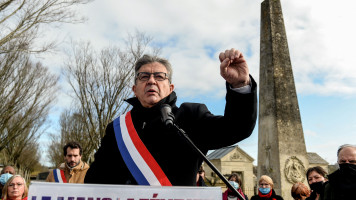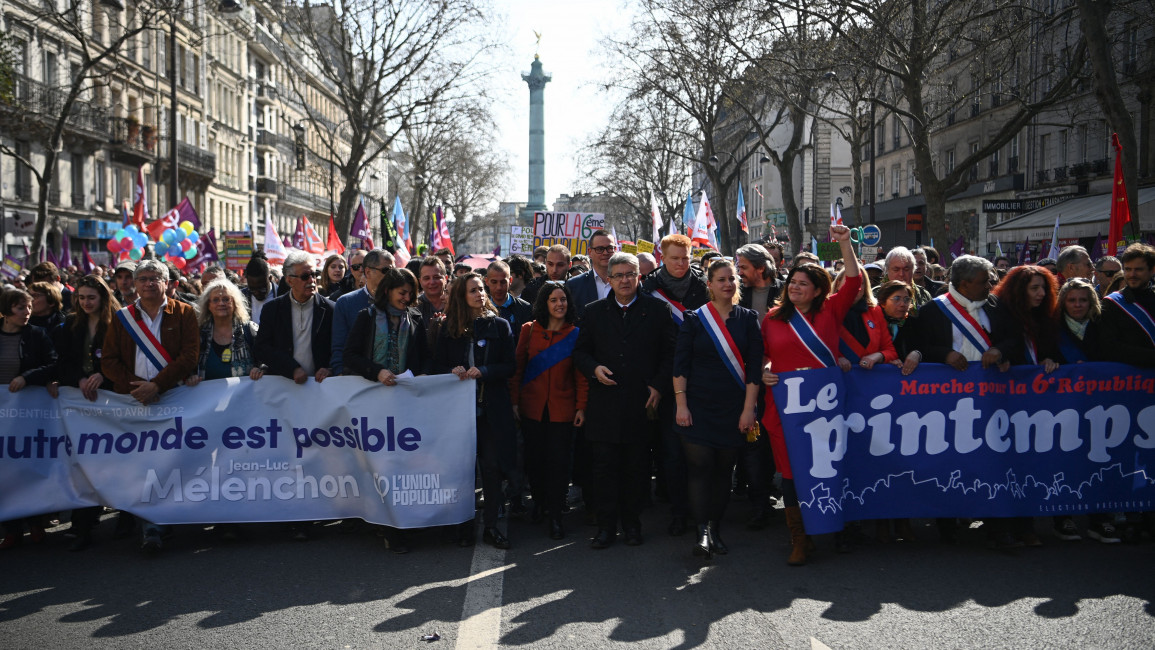
France elections 2022: With a late surge, can socialist Jean-Luc Mélenchon revive the French left?
In-depth
Days ahead of the first round of voting in the French elections, Moroccan-born leftist candidate Jean-Luc Mélenchon has surged in polls. Can his radical socialist campaign secure him a seat in the run-off for president?
Basma El Atti
05 April, 2022
05 April, 2022
A survivor of the fall of the French left has emerged from the ruins to have a shot at the upcoming presidential election: Jean-Luc Mélenchon has become France’s leading left-wing candidate after steadily rising in the polls and is now eyeing the Elysée.
Likening himself to a tortoise, the veteran leftist and leader of the France Unbowed party hopes that his third candidacy will see his slow and steady rise to win the presidential race.
A recent surge in the polls means Mélenchon is currently in third place, just a handful of points behind far-right Le Pen while centrist incumbent Macron leads the bid. If Mélenchon can make it through, he would end the decade-long absence of leftist candidates from the second round of the French election.
Known as France’s Bernie Sanders, the 70-year-old politician shares many factors with his American counterpart. Both are willingly impulsive, sanguine and do not shy away from debating his competitors. Both also find their dominant support base among younger voters.
Mélenchon’s confidence as an orator, erudition and dry sense of humour are seen by his supporters as a display of his authenticity.
"Born in Tangier, the veteran politician witnessed in his early childhood Morocco’s struggle towards independence from French colonisation - a struggle he said inspired his political journey"
Unlike the far-right candidate Eric Zemmour, who dismisses his Algerian roots, Mélonchon is very proud of the years he spent in the Maghreb. Born in Tangier, the veteran politician witnessed in his early childhood Morocco’s struggle towards independence from French colonisation - a struggle he said inspired his political journey.
“My first demonstration was when I was 5 years old. I had come across a demonstration with my father and my uncle, which demanded the return of Mohammed V [the king of Morocco who was exiled at the time]. I went home and was very happy to have seen those brave men, I started to go around the table shouting ‘Return to us, Mohammed Ben Youssef’. My first demonstration was for the independence of Morocco and the return of the King of Morocco to his kingdom,” said Mélenchon during his campaign in March 2022.
Mélenchon says that his time in Tangier as well as his travels to Latin America have inspired him to embrace the diversity of races and religions in one country. “I have never suffered from the panic fears and racist anxieties that overwhelm others,” he said.
Mélenchon began his political career with the National Union of Students of France before joining the Socialist Party in the 1970s until 2008, when he left after accusing it of leaning towards the centre.

Jean-Luc Mélenchon attends a presidential march with members of his party La France Insoumise on March 20, 2022. [Getty]
In 2016, Mélenchon launched his eco-socialist party La France Insoumise (France Unbowed), combining radical left-wing ideas, such as jobs for all and increasing taxes on the rich, with green-tinged proposals, including investing in green energy and banning pesticides.
His progressive campaign has proved successful with young people across the country before: Mélenchon won more 18-25 year-old votes in 2017 than either of the candidates ahead of him. He hopes to make a similar case to French youth this year.
Rap performances before his speeches, a video game of Mélenchon fighting corruption, and a Twitch channel to stream his ideas to the gaming community are bringing his perspective of “another world is possible” closer to his Gen Z voting base, particularly those from immigrant, particularly African, backgrounds.
“Honest” and “fair” is how Youssef, a Moroccan-French university student, describes the candidate’s programme.
“Taxing the rich, ensuring free higher education, unlike Macron, sound to me like the most honest and logical ideas we need in France right now. This is why I support Mélenchon,” Youssef, who at the age of 20 is navigating his first election as a voter, told The New Arab.
In 2016, Mélenchon launched his eco-socialist party La France Insoumise (France Unbowed), combining radical left-wing ideas, such as jobs for all and increasing taxes on the rich, with green-tinged proposals, including investing in green energy and banning pesticides.
His progressive campaign has proved successful with young people across the country before: Mélenchon won more 18-25 year-old votes in 2017 than either of the candidates ahead of him. He hopes to make a similar case to French youth this year.
Rap performances before his speeches, a video game of Mélenchon fighting corruption, and a Twitch channel to stream his ideas to the gaming community are bringing his perspective of “another world is possible” closer to his Gen Z voting base, particularly those from immigrant, particularly African, backgrounds.
“Honest” and “fair” is how Youssef, a Moroccan-French university student, describes the candidate’s programme.
“Taxing the rich, ensuring free higher education, unlike Macron, sound to me like the most honest and logical ideas we need in France right now. This is why I support Mélenchon,” Youssef, who at the age of 20 is navigating his first election as a voter, told The New Arab.
In-depthFlorence Massena
Mélenchon has vowed to lower the legal retirement age from 62 to 60, introduce a monthly minimum wage of 1,400 euros, and reintroduce a wealth tax as well as raise taxes on the rich.
For the young, Mélenchon wants to lower the voting age to 16, grant 1000 euros to students per month to prevent debt and introduce a form of paid civic service for people under 25-year-old.
Estimated at 3 million people, about 5-6% of the total electorate, more than a third of French people from an African background intend to vote for Mélenchon, while a quarter plan to vote for president Macron for a second term. The rest of the candidates have failed to garner support.
“It's traditional. Families from African roots or mixed families tend to support the left wing in the presidential elections, considering their pr0gressive programs towards diversity. But the division of the left camp is what divides these votes,” explained the Morocco-based political expert Olivier Deaux to The New Arab.
"Estimated at 3 million people, about 5-6% of the total electorate, more than a third of French people from an African background intend to vote for Mélenchon"
“It is time to put an end to imperialism, neocolonialism, paternalism,” Mélenchon said during his visit to Burkina Faso in 2021, emphasising that his goal as president would be "building a relationship with Africa based on the sovereignty of the peoples”.
Mélenchon has vowed to facilitate access to visas, regularise workers and institute a ten-year residence permit, and believes that minority groups are an integral component of France’s future.
The candidate has proposed that the African countries of the Franc zone be exclusively in control of their currency. He also advocates for the cancellation of debts of certain African countries which, according to him, are contracted by dictatorships to enrich their camp clinging to power.
“His opinions regarding Africa are well-established. He sounds like the only candidate who does not picture Africa as a source of danger as the other candidates do," said Ibragih, a Ghanaian student living in France.
Mélenchon is also determined to replace the country’s constitution, which gives the president a strong upper hand, with a new parliamentary system. He has promised also to fight against sexism and violence against women and to overhaul France’s police force.
RELATEDIn-depthFlorence Massena
Yet, he remains a dividing figure even among left-wing supporters. Pushing to exit NATO and end the nuclear programme in France are seen as an aggressive approach for many of the admirers of his socially-minded policies.
In addition, his aggressive remarks towards Kyiv in the past are casting a shadow on the candidate’s progressive campaign amid international empathy with Ukraine following the Russian invasion.
Mélenchon, who once supported the annexation of Crimea as legitimate, voiced his change of heart towards Ukraine after Putin’s offensive in February, as he hammered the slogan "No to war! No to Putin’s war!” in his 2022 campaign in an attempt to reverse the past position that may cost him dearly.
Just a few days away from the first round of voting on April 10, Mélenchon third-place position seems secure with 15% of the vote, but securing a final victory still seems far-off.
However, reaching the run-off against Macron and becoming the first leftist candidate to reach the second round since 2021 looks increasingly like a highly possible scenario, explained French election expert Charles Deau.
"Just a few days away from the first round of voting on April 10, Mélenchon third-place position seems secure with 15% of the vote, but securing a final victory still seems far-off"
“I believe that Mélenchon will make it to the second tour. Considering the trauma of the French presidential election in 2002, I think the leftist supporters will rally behind Mélenchon, opting for the ‘useful vote’,” Deau told The New Arab.
In the first round of the 2002 presidential election, the Prime Minister and socialist candidate Lionel Jospin was eliminated to everyone's surprise and deprived of a confrontation in the second round against the outgoing right-president Jacques Chirac.
Jospin’s elimination, which was due to a crowded and fractured left movement where votes were split among several candidates, serves as a traumatic memory that forced French voters to choose between two right candidates. Left-leaning voters will be determined to vote strategically to avoid a repeat of this scenario.
“In a two-round election, where only two candidates are selected for the second round, the useful vote consists of not wasting your vote on a candidate who one imagines has no chance of winning or reaching the second round, even if it is the one they prefer. And in this case that is Jean-Luc Mélenchon,” explained Deau.
Still, Deau believes that socially-minded voters will most likely overcome their divisions and rally behind Mélenchon, as he is the only leftist in the camp who is capable of going “tête-à-tête” against his right-wing competitors and Macron.
Basma El Atti is The New Arab's Morocco correspondent.
Follow her on Twitter: @elattibasma
Ahead of the rally, Mélenchon also launched a "pocket hologram" filter of himself on Instagram and Snapchat, allowing anyone to conjure the ambitious far-leftist wherever they like. On Twitter, some posted their personal, portable Mélenchons into their back gardens, inside a refrigerator door hovering among their sauces, alongside their pets or even at Ireland's parliament, all with the campaign-provided hashtag #HologrammeDePoche.
The candidate, for his part, tweeted a video of himself with a mini-Mélenchon "teleported" onto his own shoulder urging supporters to go vote on April 10.
No comments:
Post a Comment